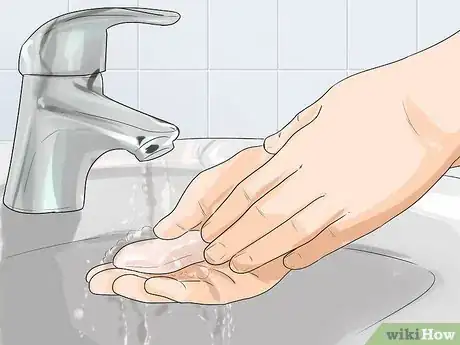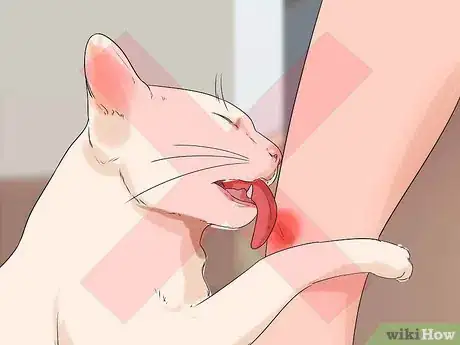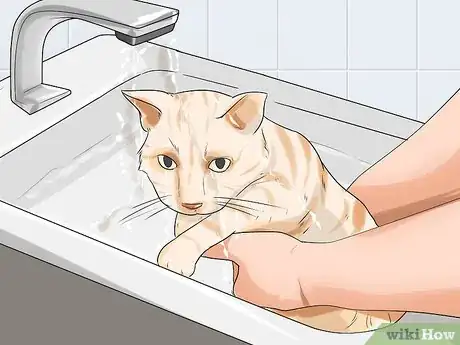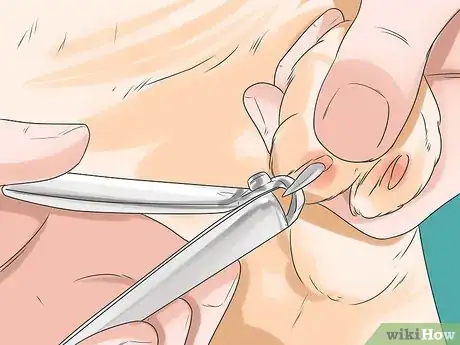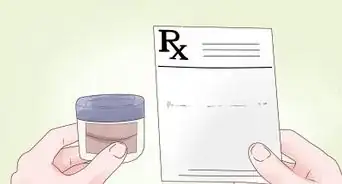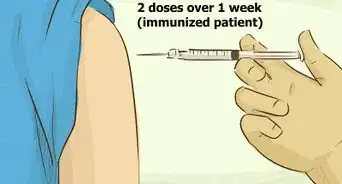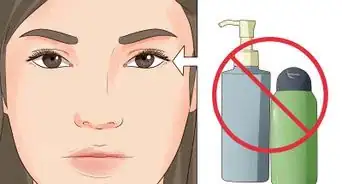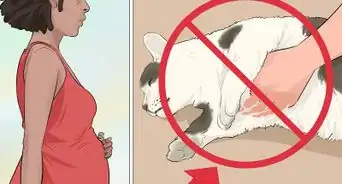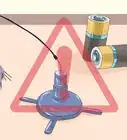This article was co-authored by Chris M. Matsko, MD. Dr. Chris M. Matsko is a retired physician based in Pittsburgh, Pennsylvania. With over 25 years of medical research experience, Dr. Matsko was awarded the Pittsburgh Cornell University Leadership Award for Excellence. He holds a BS in Nutritional Science from Cornell University and an MD from the Temple University School of Medicine in 2007. Dr. Matsko earned a Research Writing Certification from the American Medical Writers Association (AMWA) in 2016 and a Medical Writing & Editing Certification from the University of Chicago in 2017.
There are 8 references cited in this article, which can be found at the bottom of the page.
This article has been viewed 33,333 times.
Cat scratch disease (CSD), also known as cat scratch fever, is a bacterial disease caused by Bartonella henselae. Most sufferers of CSD have been scratched or bitten by a cat. The disease is not usually serious, but can be if you have a weak immune system.
Steps
Staying Healthy
-
1Know if you are at risk. Some people are more likely to get CSD than others. Organ transplant patients, infants and young children, and pregnant women are more likely to get diseases from animals.[1] Those who are immunocompromised, or have a weak immune system, such as people with HIV, should be extra careful about getting CSD.[2]
-
2Wash your hands after handling your cat. Always wash your hands with soap and water after playing with your cat. Don’t play with your cats too rough or they might hurt you. If your cat bites or scratches you, wash the wound with soap and water immediately. If you start to feel ill after getting a scratch or bite, go to the doctor.[3]Advertisement
-
3Go to the doctor if you suspect you might have CSD. Cat scratch disease is hard to diagnose, but if your doctor suspects you have it they might run tests. If you have an infection at the site of a scratch or bite and/or feel ill and fatigued, you might have CSD. Typically, CSD is not serious and does not require any treatment. Sometimes you might be given an antibiotic, especially if you have a weak immune system. If you are immunocompromised, CSD becomes more serious.[4]
- Physical symptoms include swelling around the cat bite or scratch, and swollen lymph nodes, especially around the head, neck, and arms. Other symptoms include fever, fatigue, and headache. Rarely, it causes vision problems, liver disease, and confusion.
-
4Adopt older cats instead of kittens. Instead of adopting kittens, adopt cats that are over one year old. Kittens and young cats are more likely to carry CSD and are more likely to give you CSD because they are more likely to scratch.[5] If you have a weak immune system this is especially important.[6] Cats live long lives, so you still will have many years with your senior cat and older cats are not as demanding as kittens.[7]
-
5Don’t let your cats lick your wounds. This is another way that your cat can spread the bacteria that causes CSD to you. If you see your cat licking a cut or an open wound of any kind, stop them. Cover your wounds with bandages to avoid your cat being able to lick them. If you cat does lick your wound, make sure to wash it thoroughly with soap and water.[8]
-
6Don’t pet or touch stray or feral cats. The cat might not have an owner who is taking care of them, which means they are more likely to have CSD. You don’t know how a cat might react if you touch them. If you try to pet an unknown cat, they could scratch you and give you CSD.[9]
-
7Keep your environment clean. It is important to keep your house clean and free of fleas to prevent getting CSD. Vacuum your carpets regularly. To give them an extra clean use Borax or a carpet cleaner. You can also get your carpets professionally cleaned if they are particularly dirty.
- When you move into a house or apartment you should make sure to get the carpets and floors thoroughly cleaned.
- Before you vacuum, shake and punch out your cushions and pillows on the floor.
- Wash all your bedding in the hottest water possible to kill fleas.[10]
Protecting Your Cat
-
1Protect your cat from fleas. The bacteria that causes CSD is carried by fleas, making it a major risk factor for CSD in cats. When they bite or leave flea dirt on your cat it can cause your cat to get CSD. Apply preventative flea product to your cat once a month. Make sure that the flee medicine is approved by your veterinarian because there are flee products that are harmful to cats.
- Check your cat regularly for fleas with a flea comb.[11]
- Regularly bathe your cat to remove any flea dirt off of them.[12]
- Purchase a self-releasing collar for your cat that prevents fleas.
-
2Keep your cat’s nails trimmed. Every few weeks you should trim your cat's claws to maintain your cat's health. You can get CSD from your cat biting or scratching you hard enough to break the skin, so it is important to keep your cat's nails short. Nail-trimming is a fast, effective and humane alternative to declawing. Use special nail clippers designed to safely cut their claws. Restrain your cat with a helper or by using the crook of your arm.
- Press down with your thumb on the joint behind the claw then quickly cut the nail.
- Don't cut the pink part of the nail; if you do your cat will bleed. If this happens apply pressure to the wound.
- Don't continue if your cat is too upset. You don't have to do all the claws at once.[13]
-
3Schedule routine veterinary check-ups. Although CSD usually has no symptoms in cats, on rare occasions it can cause inflammation of the heart (which can make your cat very sick). It is important to regularly go to the vet to make sure your cat is healthy and that they don’t have flees. You should go to the veterinarian at least once a year, and immediately if your cat becomes sick or hurt.[14]
-
4Keep your cat indoors. If you really want to prevent CSD, especially if you have a weak immune system, you should keep your cat indoors. Cats can get CSD from fighting with other cats who have CSD. If another cat scratches your cat, they can get the bacteria and spread it to you. Outdoor cats are also more likely to pick up flees, which also can cause CSD.[15]
Warnings
- If you are bitten or scratched and suffer any of the symptoms listed above, contact your doctor immediately.⧼thumbs_response⧽
- Bacillary angiomatosis and Parinaud's oculoglandular syndrome are rare complications of B. henselae infection.⧼thumbs_response⧽
References
- ↑ http://www.cdc.gov/healthypets/specific-groups/index.html
- ↑ https://medlineplus.gov/ency/article/001614.htm
- ↑ http://www.cdc.gov/healthypets/diseases/cat-scratch.html
- ↑ https://medlineplus.gov/ency/article/001614.htm
- ↑ http://www.bphc.org/whatwedo/infectious-diseases/Infectious-Diseases-A-to-Z/Pages/Cat-Scratch-Disease.aspx
- ↑ http://www.cdc.gov/healthypets/diseases/cat-scratch.html
- ↑ https://www.petango.com/Blogs/Advice-on-Adopting-Older-Cats-1854
- ↑ http://www.cdc.gov/healthypets/diseases/cat-scratch.html
- ↑ http://www.cdc.gov/healthypets/diseases/cat-scratch.html
- ↑ http://www.preventivevet.com/cats/fleas-how-to-prevent-and-treat-your-cats-greatest-nuisance
- ↑ http://www.cdc.gov/healthypets/diseases/cat-scratch.html
- ↑ http://www.preventivevet.com/cats/fleas-how-to-prevent-and-treat-your-cats-greatest-nuisance
- ↑ http://www.humanesociety.org/animals/cats/tips/trimming_cat_claws.html
- ↑ http://www.aspca.org/pet-care/cat-care/general-cat-care
- ↑ http://www.cdc.gov/healthypets/diseases/cat-scratch.html

